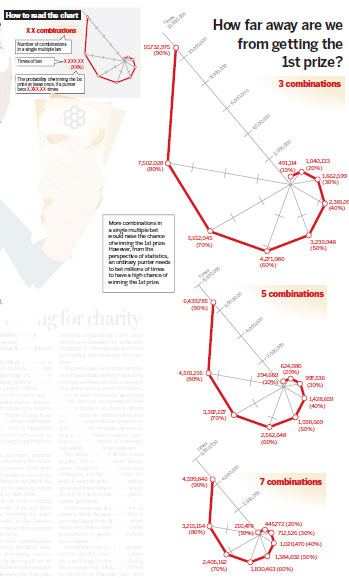Punting for charity
Updated: 2016-11-18 09:53
By Oswald Chan in Hong Kong(HK Edition)
|
|||||||
The Mark Six lottery is one of Hong Kong's most popular legal channels of gambling, with 56 percent of its people trying their luck in the lottery which is drawn thrice weekly, according to a report, "Study of Hong Kong People's Participation in Gambling Activities", released in March 2012 by Hong Kong Polytechnic University.
According to the report, commissioned by the Secretary for Home Affairs, some 64 percent of the city's residents aged between 40 and 49 are almost addicted to the Mark Six, with 76 percent of them spending HK$100 or less on each draw.

But, what are the odds of hitting the jackpot or one of the top three prizes? It's like "scouring the ocean floor for a needle", so the Chinese saying goes, no matter how a punter places his or her bets.
Betting with more combinations of numbers would, probably, raise one's chances of winning. And, to widen the net by having all the 49 numbers covered in a single multiple bet to ensure winning the first prize would set a punter back by a whopping HK$140 million.
So, why are pathological gamblers still addicted to the Mark Six? The inherent motivations of compulsive gambling are related a sphere of psychological, social and environmental factors.
From the psychology point of view, most pathological gamblers exhibit certain gambling behavior and perceptions of gambling. They often exhibit a personality for sensation, engaging in stimulating activities and having low toleration for boredom.
They also have a positive perception of gambling, viewing it as a form of social activity and even treating it as a career and a source of income. They harbor erroneous gambling beliefs, such as interpretative bias and the illusion of control, which cause them to be overconfident, and believe in supernatural powers in governing their winning chances, as well as other forms of control, leading to the cultivation of irrational and addictive gambling behavior.
The social influence factor is also at play. The need for social acceptance, recognition from peers and colleagues, and family bonding; the lack of parental guidance, as well as an escape from disharmony at home, are also key factors that breed pathological gamblers.
Environmental factors, such as stress at work, the easy availability of personal loans from banks or credit cards, and greater availability of and accessibility to gambling activities are to blame.
According to the Hong Kong Jockey Club (HKJC), total revenues from the city's legal forms of gambling hit a staggering HK$202.7 billion in the 2015-16 financial year, with revenue from the Mark Six lottery alone accounting for HK$8.5 billion.
From the macroeconomic perspective, the Mark Six lottery has made enormous contributions to the local economy.
In the 2015-16 financial year, the HKJC reported a 6-percent increase in turnover to HK$202.7 billion. The HKJC, founded in 1884, is the government-endorsed operator providing horse racing, the Mark Six lottery and betting on overseas footfall events, and is the largest taxpayer, as well as the largest community benefactor, in Hong Kong.
The club has contributed HK$20.9 billion in betting duty and profits tax to the Hong Kong government and HK$1.3 billion to the Lotteries Fund (created in June 1965 by the Legislative Council for financing social welfare services). It has so far donated HK$3.5 billion (88 percent of the operating surplus after tax) to the Hong Kong Jockey Club Charities Trust, formed in 1993 to enhance the club's administration in donations,
According to the HKJC website, the Hong Kong Jockey Club Charities Trust has donated an average of more than HK$2.1 billion annually to the community in the past decade through its own major initiatives and donations, and supports the projects of more than 140 charitable groups and organizations each year.
In the 2015-16 financial year, the HKJC' donations to the community exceeded HK$3.9 billion, benefitting 215 charitable and community projects and creating more than 22,200 jobs.
The club also supports many social and education institutions, including the Jockey Club Government Secondary School in Kowloon Tong and the Jockey Club Ti-I College in Sha Tin, as well as the running of public sports projects like football and swimming facilities.
oswald@chinadailyhk.com


(HK Edition 11/18/2016 page8)